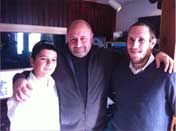Part of him still lights up the path of my life
Eitan Kleinman's memorial song:
"Harel's Tears"
Eitan Kleinman's memorial song:
"Harel's Tears"
The story of the song Harel's Tears began 17 years ago when the life of Lieutenant Harel Shrem z"l came to an end when he was only 21. Harel, an officer in Brigade 188 of the tank corps was serving in the security zone in Lebanon. Although he had been away from home for four consecutive weeks, he opted to remain yet another Shabbat with his company, despite his family's plans to celebrate his niece's birthday that Shabbat. Harel decided that it was he who was most suited to command a complicated maneuver to open a route into hostile territory. Along with his crew he carried out the task. Towards the end, minutes before they turned to come back, the tank was hit by missiles. Harel who was standing exposed in the turret was killed on the spot.
Eitan Kleinman, composer and performer of the song Harel's Tears, relates: "To this day I still recall the telephone call telling me of Harel's death. The pain and sorrow that pierced my heart have never gone away." Eitan, who was at the time in advanced training in the tank corps, had known Harel from the "Golan" Hesder Yeshiva where they both learned. "Harel had in him a serenity and a quality that reached out from a distance and touched you, he was a role model to many." That night Eitan was guarding the tanks. He recalls that "the tanks stood silent, immobile, but the winds howled strongly both outside and within and so the song was born."
As soon as he finished guard duty, Eitan wrote down the words that had become engraved in his mind. "I still have the scrap of paper covered with tank grease", he notes. The song lay in a drawer for a year until he mustered the courage to give it to the family. "I asked myself if it would hurt them, cause them needless pain? Only after I met them did I realize the truth of the words that I had written: "Part of him still lights up the path of my life" and how important it is to the family, how much strength they derive from knowing that so many people carry Harel's memory in their hearts, and how much it affects their lives."
Harel's Tears stayed in the drawer for another 16 years. "It was obvious to me that when I brought out my first album, Harel's Tears would be an integral part of it, I just didn't think it would take so long", Eitan adds with a smile. Recently, when his album About to Change came out, Eitan contacted the family and gave them the song he had written about their son. "Today, 17 years later, it is clear to me how the pain of his death does not get better… like a bullet that has torn, it is never healed (words from the song). How much Harel's absence is felt amongst his friends who have grown up, got married and are now parents of children that will soon be drafted into the army." The family were moved by Eitan's revelations. Moshe Shrem, Harel's father, says the family are amazed how each year new things are revealed about Harel, from another angle of a person whose life was touched by Harel.
By amazing coincidence the family asked Eitan to sing Harel's Tears at an event marking 5 years since the establishment of the Meir Harel hesder yeshiva in Modiin, named after Harel. The event was attended by many distinguished guests, among them the IDF Chief of Staff. Eitan relates "I found myself singing Harel's Tears before the family, hesder soldiers and the Chief of Staff. A song is like a child that you set free in the world, never knowing where the child will get to or what he will do. And I could not have hoped for more than this."
But the song's story does not end there. Just recently Eitan had a meeting with a producer about a clip they planned to make for one of the songs from About to Change. " I met Binyamin (Astorlis the producer of the clip) through the internet", says Eitan. "When we met and talked about the album About to Change and the planned clip, I happened to mention the song Harel's Tears and its amazing story. Binyamin volunteered to take upon himself the making of a clip of the song, which left me without words, hearing again the echoes of
a snatch of the song "Part of him still lights up the path of my life". The purpose of a visual clip is to retain the powerful effect of the music on the one hand, whilst also portraying the meaning. I think Binyamin did a great job in presenting another dimension of life in the clip, the right way to remember Harel."
By amazing coincidence the family asked Eitan to sing Harel's Tears at an event marking 5 years since the establishment of the Meir Harel hesder yeshiva in Modiin, named after Harel. The event was attended by many distinguished guests, among them the IDF Chief of Staff. Eitan relates "I found myself singing Harel's Tears before the family, hesder soldiers and the Chief of Staff. A song is like a child that you set free in the world, never knowing where the child will get to or what he will do. And I could not have hoped for more than this."
But the song's story does not end there. Just recently Eitan had a meeting with a producer about a clip they planned to make for one of the songs from About to Change. " I met Binyamin (Astorlis the producer of the clip) through the internet", says Eitan. "When we met and talked about the album About to Change and the planned clip, I happened to mention the song Harel's Tears and its amazing story. Binyamin volunteered to take upon himself the making of a clip of the song, which left me without words, hearing again the echoes of
a snatch of the song "Part of him still lights up the path of my life". The purpose of a visual clip is to retain the powerful effect of the music on the one hand, whilst also portraying the meaning. I think Binyamin did a great job in presenting another dimension of life in the clip, the right way to remember Harel."














0 comments:
Post a Comment